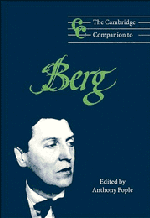Book contents
7 - The musical language of Wozzeck
from Part 2 - From song to opera
Published online by Cambridge University Press: 28 September 2011
Summary
The phrase ‘musical language’, though in everyday use, begs many questions and carries a multitude of assumptions. There is naturally a rich and varied literature which attempts to give the topic its due and to work out its detailed implications from a number of perspectives. In this brief chapter, however, the phrase is used in its everyday sense, as a convenient shorthand for the investigation of technical matters in a musical work inasmuch as they relate to what is broadly familiar, embodying an assumption that such ramification of a specific work in a shared context both supports and to some extent reveals a kind of latent musical ‘understanding’. In the present context such discussion must also reckon with the fact that Wozzeck is an opera, even if the question of genre is far from one-dimensional in this of all such works. The subtitle of Janet Schmalfeldt's impressive monograph on Wozzeck – ‘harmonic language and dramatic design’ – explicitly conjoins the notion of musical language with the idea that operatic music serves a dramatic purpose. Both her book and an earlier study by George Perle seek to relate specific musical configurations to characters, situations and symbols in the drama. As the format of Perle's article acknowledges, this approach owes much to an exegetic line of writing about opera that developed in the post-Wagnerian period. Indeed, the examples of Berg's own guides to Schoenberg's Gurrelieder and Pelleas und Melisande serve to remind us that during his lifetime such writing frequently spilled over into discussions of non-operatic works.
- Type
- Chapter
- Information
- The Cambridge Companion to Berg , pp. 145 - 164Publisher: Cambridge University PressPrint publication year: 1997



